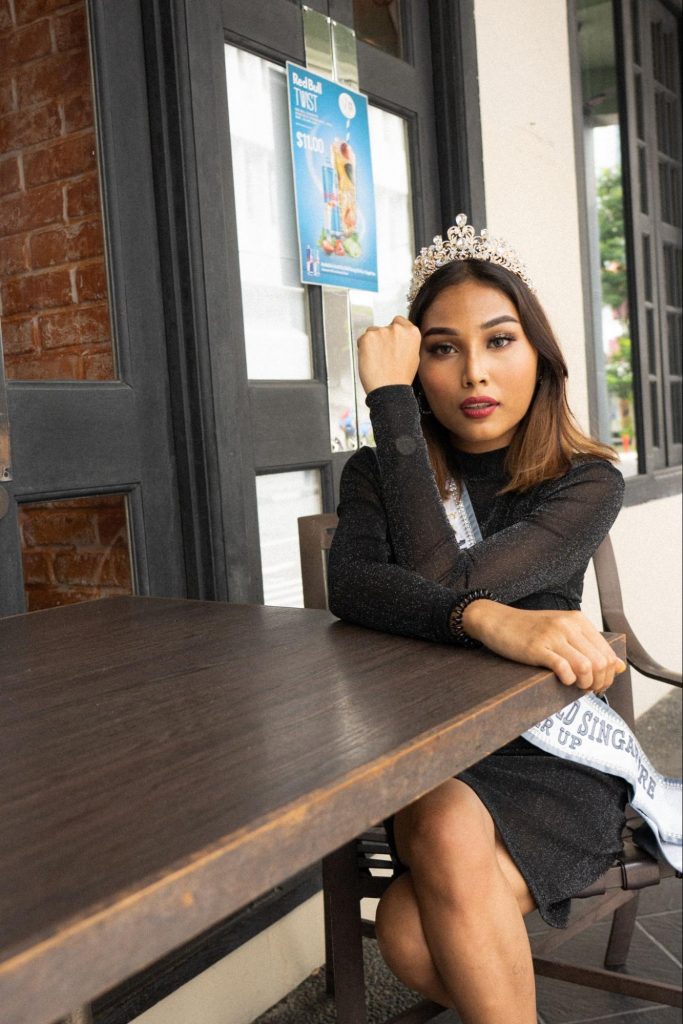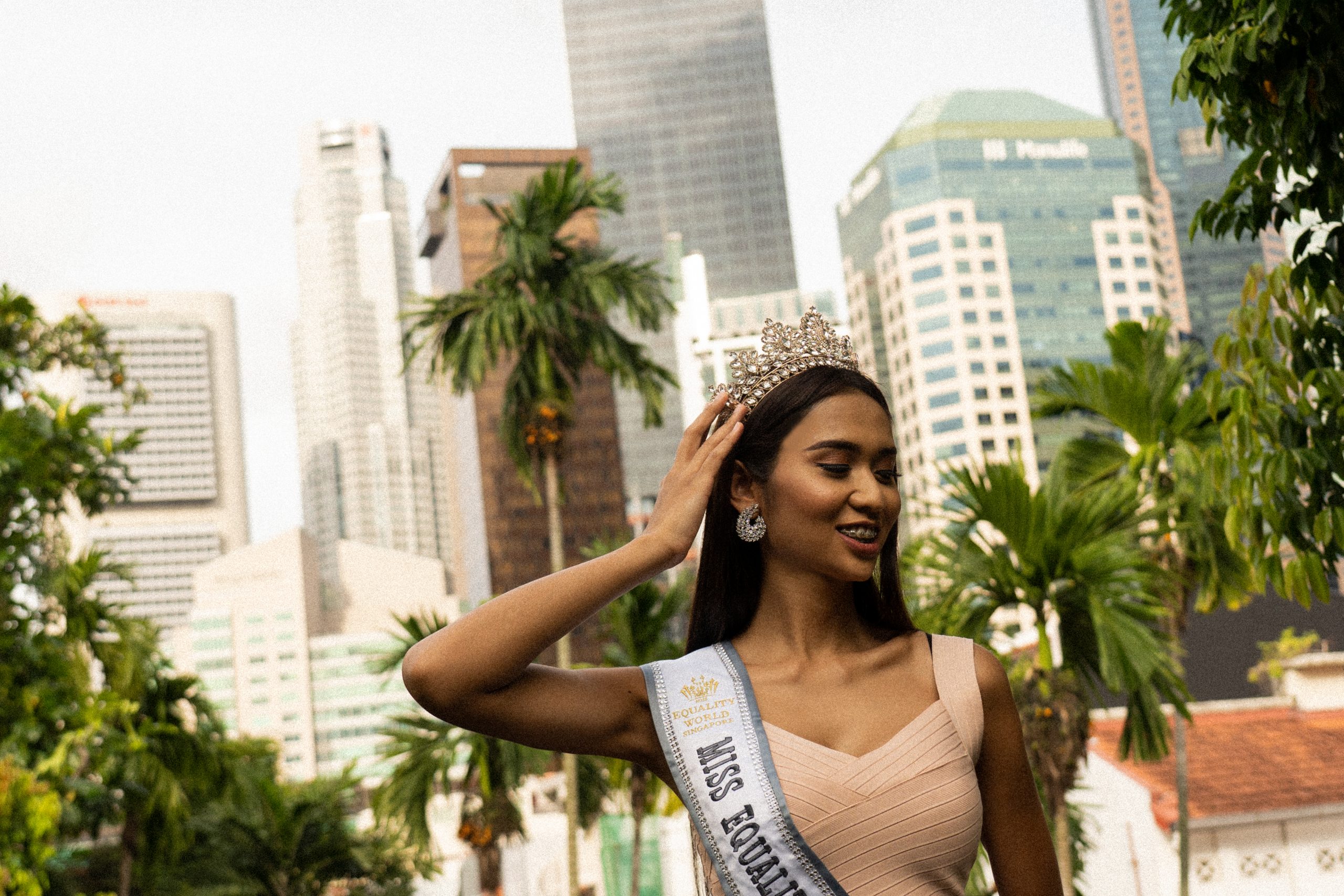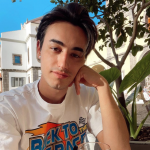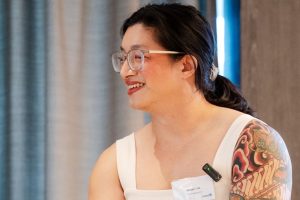All images by Isaiah Chua for RICE Media.
When Andrea Razali returned from Miss International Queen in 2020—the trans equivalent to Miss Universe—her mental health took a turn for the worst.
“The pressure for trans women is incredibly high,” the model and entrepreneur shares. “And I never aspired to be in a beauty pageant. But I joined because I wanted a bigger platform for my advocacy.”
ADVERTISEMENT
Over the past few years, Andrea has been one of the most vocal campaigners for trans rights in Singapore, and representing trans women from her country on an international stage felt like the natural next step for her.
While the Miss International Queen stage did give her one of the biggest platforms of her career yet, she couldn’t help but leave feeling empty. The Singaporean media barely mentioned her achievement, she received little support from many trans allies, and she suffered from the pressures to look and behave a certain way during the competition.
“At the end of the day, a beauty pageant is a business, so when you work so hard to get a crown and you don’t win, you feel like another number,” she says.
She brought up how former Miss USA, Cheslie Kryst, died from suicide.
“Many pageant girls enter pageants for the platform, and the pressure on perfectionism is something we need to deal with,” she elaborates.
“People will always have something to say—about our looks, our choice of dress, our intelligence. Imagine being judged like that every day. I never was in that position until I was crowned Miss International Queen Singapore.”

From Beauty Pageant Winner to Business Mogul
When I last met Andrea in 2020, she told me her experience at Miss International Queen left her questioning how effective a beauty pageant can be in raising awareness about trans rights.
“Imagine being in a room with 25 trans girls—all with an incredible story—except nobody cares about that,” she told me when she returned that year.
“When I went to the pageant, saw my equals being treated like that, heard their story, then saw their social media, it struck me—no one cares how much pain you have been through. People only care how beautiful you are.”
After Miss International Queen, Andrea had a mission to put a more diverse array of trans women at the forefront of the media—not only women excelling in the beauty and entertainment industries but also businesswomen and family women alike.

When we met again, over a year later, this goal was already coming to fruition.
ADVERTISEMENT
It starts with herself—Andrea now works as a para-counsellor, has a corporate job, and is undertaking a master’s in psychology. But the irony is that we didn’t meet to discuss these new ventures, but rather, how she became the National Director of Miss Equality World, a new international beauty pageant.
But didn’t you want to leave the industry entirely? How do you go from that to running a pageant?
“I was sick of being one of the only trans women in the limelight here in Singapore,” she confesses. “When I went to Miss International Queen, I saw the platform it gave me. So I wanted to give the girls here a similar platform.”
“Before transitioning, I remember wishing there were more trans role models. And when I became Miss International Queen, there were so many young people coming to me saying I was their role model. While I have always wanted to be an activist for trans women, I also don’t like seeing how only my story gets pushed out again and again when so many other trans women here have stories that need to be heard.”
Miss Equality World Singapore
Qatrisha Zairyah Bte Kamsi is the first winner of Miss Equality World Singapore. She shows up for our interview and photoshoot in a well-fitted dress and heels, remaining poised throughout. While her appearance was striking, it didn’t overpower her soft-spoken and genuine personality.
“As a child, I would wear my sister’s clothes and put on my mum’s lipstick,” Qatrisha recalls when I ask her about the moment she knew she was trans.
“And one day when I was five, my mum dressed me up as a girl and told me that no matter what I am still her child. She was so supportive, and so was my grandma.”
Qatrisha never had a ‘coming out’ moment, nor did she ever have a sudden realisation that she was trans. Thanks to her supportive mother and grandmother, her childhood allowed her to gradually transition into the woman she is today.
It’s a heartening tale, and I tell Qatrisha how unfortunately rare it is to meet individuals in the LGBTQ+ community with positive coming-out stories. Especially as journalists, I find we often hone in on the profiles with traumatic pasts in a virtuous attempt to reach out to the masses.

Qatrisha’s story offers an experience that is vastly different yet equally valid than those we often read about. She grew up with a supportive mother, met a boy she loved in NS, transitioned, got married, got a full-time job, and now lives in her BTO flat with the love of her life.
But the more Qatrisha peeled the layers of her past, the more it became apparent that it wasn’t just luck that allowed her to come so far, but rather, her ability to make decisions that prioritised her happiness in the face of adversity.
Growing up, her stepfather disapproved of her identity. She confessed that she hasn’t told him about her transition, marriage, or the fact that she currently lives with her husband and won Miss Equality World Singapore. As a result, her mother and grandmother couldn’t be there to support her at the pageant’s award ceremony.
Her husband’s family also resisted Qatrisha’s marriage. The couple lived with them for a while but were eventually forced to leave over a disagreement. At the time, Qatrisha was working as a retail assistant, and her boyfriend was still in NS. Yet, they somehow managed to scrape together enough money to pay for the small rented bedroom they shared.
“My mum helped so much,” Qatrisha said. “She would send us food when we couldn’t afford it ourselves. She taught me what motherhood is about, and she has shown me what unconditional love means.”
The Importance of Realistic Trans Role Models
Backstage botox injections, overdosing on estrogen, excessive surgeries—Andrea witnessed all these and more at Miss International Queen.
“They just wanted to look beautiful on the last night,” she shares, revealing details about the contestants risking their health to enhance their appearance.
Andrea vowed not to promote a similar culture when running Miss Equality World Singapore. Beyond beauty, Andrea ensured that personality and commitment became critical criteria for the competitors to be assessed against.

Like Qatrisha, Antasha Zahra Ulhaq, the 20-year-old runner-up of Miss Equality World, has had very minimal work done on herself. She’s bubbly and energetic, yet often has to compose herself around Andrea’s motherly presence.
“A true Gen Z kid,” as Andrea calls her.
Antasha has a sizeable social media following thanks to her humorous personality. But despite her following, Antasha confessed that she has still faced immense pressure to live up to the beauty standards of the trans community.
“It’s all a part of our gender dysphoria because, at times, you feel extremely self-confident, but then there are days when you feel so vulnerable,” she reveals. “When it kicks in, you start questioning if you’re pretty, and you start thinking of all the parts of you that you could fix.”
“Ironically, joining the beauty pageant has made me feel the most confident I’ve ever been. Even if I haven’t gotten any surgeries done, coming this far was proof to me that I am okay as I am.”
“You must be happy with who you are first. You must be happy inside out, or you will never be happy no matter what you change on the outside.”

Pose
“I like lifting people up because I’ve been lifted up by others when I was struggling,” Andrea intones as we discuss how beauty pageants have the power to be both empowering and discriminating.
“And the gratitude that comes with that is so much more fulfilling than making everything about me.”
“I wanted to grant this dream to another girl. And it’s life-changing. It seems like only two minutes of me putting a crown on her, but it can change her future forever. You see me now? I wouldn’t be where I am or who I am without the crown. It gave me so much confidence.”

While Miss Equality World Singapore is only a tiny beauty pageant compared to the many across the globe, it is an immense source of empowerment for the trans women competing, but above all, trans women in Singapore.
Seeing Qatrisha don her crown reminded me of when Angel, from Netflix’s Pose, donned a wedding gown to marry her boyfriend, Papi. The TV series paints a tragic portrait of the trans community during the AIDS epidemic in New York City, and the lead actress, Michaela Jaé Rodriguez, is the first trans actress in history to win a Golden Globe Award.
At the end of season 3, Angel’s fairytale marriage is sandwiched between a series of tragedies ridden by discrimination and death. As the impacts of drugs, prostitution, and poverty grappled the queer community, her story was an assurance of life beyond those hurdles.
In a toast before the big day, Angel addressed her community, thanking them “for showing the true meaning of family, [which] I probably would have never known what that is without you.”
“I realise how incredibly rare it is for girls like us to get to be the romantic heroine in any story,” she continued. “To get the prince and the fairy tale. I recognise that I may be the first girl to walk down this aisle, but I refuse to be the last.”
Like Angel, Qatrisha’s win at Miss Equality World Singapore, especially as a married businesswoman, lights up the runway of endless opportunities for the trans community here. And more importantly, it shows them that there is a community here ready to cheer them on while they make their run.






